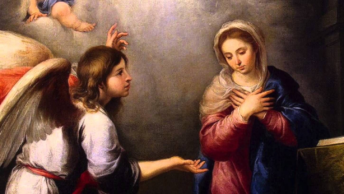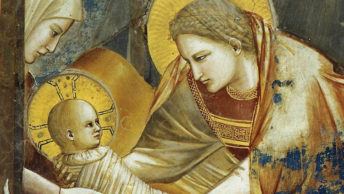The old name given to the third Sunday of Advent is “Gaudete.” It is imperative mode, second person plural of the Latin verb “gaudeo, gaudes, gavisus sum, gaudere.” It is an order similar to the orders that we give each other out of love or politeness: “have a nice day, enjoy your meal, bon voyage, take care.” It is all about our well-being. Rejoice!
So this Sunday’s readings deal with God’s brand of joy, of happiness. In other words, these readings offer God’s way, God’s suggestions for achieving the ultimate and the most basic quest of every human heart: genuine joy.
Right away we become moderately confused, even pulled in two opposite directions and potentially torn: God is pulling us in one direction and the world is pulling us in the opposite direction.
Who is right? Who provides the sure way to genuine joy and true happiness? Who has our best interest at heart whenever suggestions are given as to the way to happiness?
Let me give you, briefly, first the world’s suggestions:
Number one is, by far, money. Get it any way you can. Preferably without getting in trouble with the law; but get as much of it as you can possibly grab. Why money? Because the world knows that the situation is not the best, that there is something basically wrong that is affecting everything and everyone in a negative way (this is what Jesus and the Church call “sin”), but doesn’t know what to do about it.
The world’s answer to sin and to evil that flows from it is diversion, flight, replacement, covering up, is numbing the senses, is altering the state of mind and so on. Money can buy all those nice things that can numb the senses, alter the mind, divert attention from hardships; money can buy sex, drugs, alcohol, speed, fun, comforts, and any substitute and replacement we can think of. What about those who cannot get to all these fun things? What happens after one gets bored with every single one of these nice things? Too bad! Move on or step aside.
On the opposite side of the spectrum we have God’s plan of salvation which is a fancy way of saying God’s way to genuine joy, to the realization of His “gaudete” order. In a nutshell God’s plan for joy is Jesus! This is the answer that John was given while in prison. Jesus is the one who is to come to show us the way to happiness. Notice right away how God, unlike our hapless world, goes directly to the root of unhappiness. It is to be found in sin and in the havoc that sin wreaks into everyone’s life. Thus the first step to genuine joy is God’s gift of healing, of fixing what was broken by evil.
“The blind regain their sight, the lame walk, lepers are cleansed, the deaf hear, the dead are raised…”
And God doesn’t forget perhaps the most broken, the poor. Those who cannot get hold of what the world suggests as a cure for ills and the key to happiness, the money-less have the good news proclaimed to them. It follows that we, who are seeking the way to genuine joy, should either accept our poverty or become poor in spirit. This poverty is actually the secret condition required to achieve lasting joy. It is basic acknowledgement that we cannot heal ourselves; that we cannot fix our brokenness; that we need Jesus.
The second phase towards happiness is docility; it is willingness to be always in a listening mode with our God, it is spiritual flexibility as opposed to rigidity and arrogance. John the Baptist, broken and imprisoned, has to accept that Jesus’ way is the correct way; it is much gentler, more soothing, less harsh than his old ways of confronting his audience. And we too must learn to wait for God to tell us how we can ease worries and anguish about our future and about our families. Were we to rush to fix things our way just because we feel we have to do something, we might make things worse or feel frustrated in our failures. By listening to God we would replace our anguish and our restlessness with the success guaranteed by our allowing God to be God and we playing the role of docile tools in His hands.
Finally, our way to happiness requires patience. Nothing beautiful happens in a hurry. As St. James points out so plainly, the farmer does his part, and only his part, then he has to wait for the joy of harvesting to come in due time. As we wait for events to unfold, (a process which can be so very slow, so painfully delayed), we can enjoy the things that money can buy, starting with what we need for our daily life and for the well-being of our family. However, we should not consider them as ends in themselves but as means given us by God to love and to serve.
This is God’s brand of happiness. Obviously, the world’s and God’s ways do not mix. We have to choose one or the other. Straddling the issue would just delay our enjoyment.








